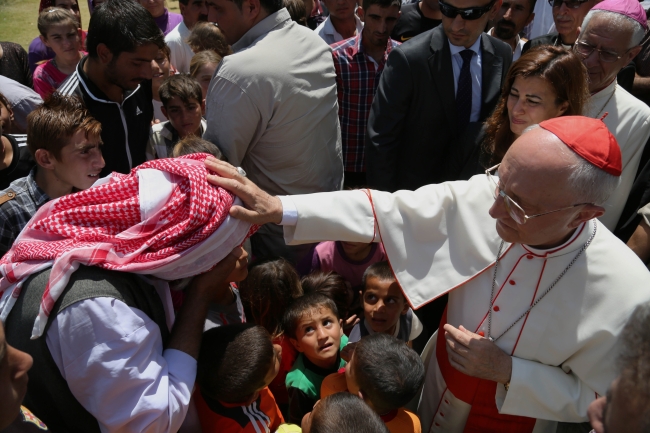Kurds fight to retake Iraq’s largest dam after ‘massacre’
By Korea HeraldPublished : Aug. 17, 2014 - 21:16
BAGHDAD (AFP) ― Kurdish forces backed by U.S. warplanes battled on Saturday to retake Iraq’s largest dam from jihadist fighters, a day after militants carried out a “massacre” of dozens of villagers.
Two months of violence have brought Iraq to the brink of breakup, and world powers relieved by the exit of long-time premier Nuri al-Maliki were sending aid to the displaced and arms to the Kurds.
Kurdish forces attacked the Islamic State (IS) fighters who wrested the Mosul dam from them a week earlier, a general told AFP.
“Kurdish peshmerga, with U.S. air support, have seized control of the eastern side of the dam” complex, Major General Abdulrahman Korini told AFP, saying several jihadists had been killed.
Two months of violence have brought Iraq to the brink of breakup, and world powers relieved by the exit of long-time premier Nuri al-Maliki were sending aid to the displaced and arms to the Kurds.
Kurdish forces attacked the Islamic State (IS) fighters who wrested the Mosul dam from them a week earlier, a general told AFP.
“Kurdish peshmerga, with U.S. air support, have seized control of the eastern side of the dam” complex, Major General Abdulrahman Korini told AFP, saying several jihadists had been killed.

Buoyed by the air strikes U.S. President Barack Obama ordered last week, the peshmerga fighters have tried to claw back the ground they lost since the start of August.
The dam on the Tigris provides electricity to much of the region and is crucial to irrigation in vast farming areas in Nineveh province.
The recapture of Mosul dam would be one of the most significant achievements in a fightback that is also getting international material support.
A day after the European Union foreign ministers encouraged the bloc’s member countries to send arms to the Kurds, German Foreign Minister Frank-Walter Steinmeier visited Iraq.
Steinmeier, whose country hosts the largest diaspora of the Yazidi religious group in the West, visited the autonomous region to assess the needs of the displaced, many of whom are Yazidis, and the peshmerga.
Fear of an impending genocide against members of Iraq’s Yazidi minority, whose faith is anathema to the Sunni Muslim extremists, was one reason Washington cited for air strikes it began on Aug. 8.
Senior Kurdish official Hoshyar Zebari said that in the village of Kocho, jihadists on Friday “took their revenge on its inhabitants, who happened to be mostly Yazidis who did not flee their homes.”
Human rights groups and residents say IS fighters have demanded that members of religious minorities in Iraq’s Nineveh province, where Kocho is located, either convert or leave, unleashing violent reprisals on any who refused.
Zebari put the toll at around 80 people killed in Kocho, while a senior official of one of Iraq’s main Kurdish parties said 81 people had lost their lives, and a Yazidi activist said the death toll could be even higher.
The village lies near the northwestern town of Sinjar, which the jihadists stormed on Aug. 3, sending tens of thousands of civilians, many of them Yazidi Kurds, fleeing onto Mount Sinjar to the north.
They hid there for days with little food or water.
Mohsen Tawwal, a Yazidi fighter, said he saw a large number of bodies in Kocho on Friday.
“We made it into a part of Kocho village, where residents were under siege, but we were too late,” he told AFP by telephone.
“There were corpses everywhere. We only managed to get two people out alive. The rest had all been killed.”
The Pentagon announced that U.S. drones had struck an IS convoy leaving the village on Friday after receiving reports that residents were under attack.
The outcome of the strike was not immediately clear.
Amnesty International, which has been documenting mass abductions in the Sinjar area, says IS has kidnapped thousands of Yazidis since it launched its offensive in the region on August 3.
Members of the Christian, Turkmen and other minorities have also been affected by the violence.
In New York, the U.N. Security Council unanimously adopted a resolution aimed at weakening the jihadists, who control large areas of neighbouring Syria as well as of Iraq.
The resolution “calls on all member states to take national measures to suppress the flow of foreign terrorist fighters”, and threatens sanctions against anyone involved in their recruitment.
When jihadist forces began their Iraq offensive on June 9, peshmerga forces initially fared better than retreating federal soldiers, but the U.S.-made weaponry abandoned by government troops turned IS into an even more formidable foe.
The militants were able to sweep through the Sunni Arab heartland north and west of Baghdad in June, encountering little effective resistance, and Iraqi federal security forces have yet to make significant headway in regaining ground.
-
Articles by Korea Herald





![[Herald Interview] 'Amid aging population, Korea to invite more young professionals from overseas'](http://res.heraldm.com/phpwas/restmb_idxmake.php?idx=644&simg=/content/image/2024/04/24/20240424050844_0.jpg&u=20240424200058)












![[KH Explains] Korean shipbuilding stocks rally: Real growth or bubble?](http://res.heraldm.com/phpwas/restmb_idxmake.php?idx=652&simg=/content/image/2024/04/25/20240425050656_0.jpg&u=)

